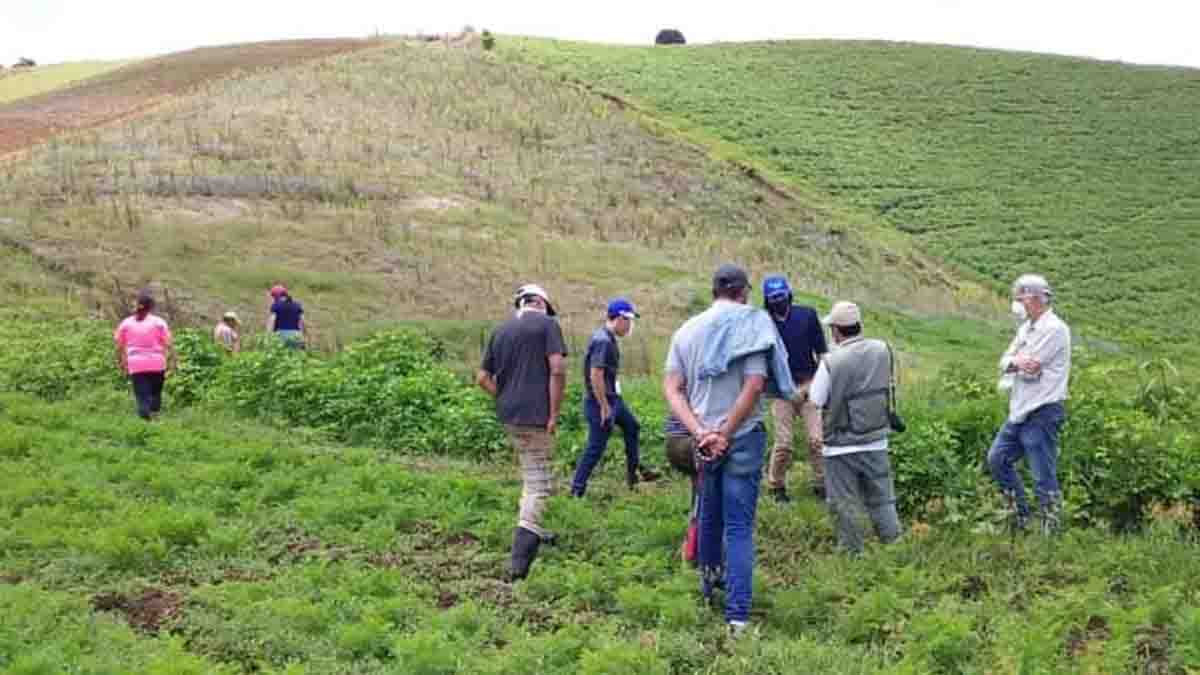
In response to the last community inspection carried out on Sunday, June 21st, 2020, where photographs were taken with a drone, it was evidenced that the water intake called “Plantón” is completely surrounded by crops that use agrochemicals, disrespecting the 200 meters that by law must be considered to safeguard communities water supplies.
By order of the AyA (National Institute of Aqueducts and Sewers) hierarchy, the AyA National Water Laboratory was present and they took water samples both in the network and in the Plantón Cipreses water intake. Unfortunately the samples when taken to the laboratory were used to search for typical agrochemicals from the pineapple industry such as bromacil and NOT those used in the horticultural areas of Cartago.
“We are not satisfied with the ASADA (National Water Supply Administrators) statement, where they point out that there is no contamination, since AyA should have analyzed the agrochemicals indicated in the previous report that indicated pesticides can be presented as contaminants in the source of Plantón Cipreses water intake,” indicated environmental agrobiologists and neighbor of the Cipreses, Fabián Pacheco.
Likewise, he continues saying: “We have provided for reference and guidance to the National Water Laboratory the report of the National University: “Diagnosis of water, soil and horticultural products contamination by the use of agrochemicals in the micro basin of the Plantón and Pacayas ravines in Cartago, Costa Rica ”. The report indicated is that of the Regional Institute for Studies on Toxic Substances of the National University.
- As of August 1st, the Vehicle Circulation Restriction Exceptions Permit Will be Valid for Two Months
“Pesticides that must be evaluated in future water samples include: pentachloroaniline, hexachlorobenzene, DDE-pp, cincozene, flutolanil, protiophos, pentachlorobenzene, technacene, pentachloroaniline, mancozeb, propined, carbendazine, phorate.
“All the previous mentioned pesticides are the most used in the area, you cannot find something that you are not looking for,” said Agricultural Engineer David Molina, who is a neighbor of the area and is concerned about contamination with agrochemicals that supply the water for their community. Likewise, he continues saying: “the presence of nitrites and nitrates typical of water contamination by activity with agrochemicals was also not analyzed.”
For her part, community leader Isabel Méndez, a neighbor of Cipreses Oreamuno, indicated: “We are concerned about the high presence of residual free chlorine that comes out in the water network, it can be seen in the analysis with a result of 0.76 mg / L, and that’s way more than allowed. Personally I have suffered from the stomach for a long time and I am concerned that the presence of so much chlorine in the water is gravely affecting me”, she also continues saying: “we are going to continue working on monitoring the quality of our water supplyand taking care of its nascent sources”.
The “Ecological Front of Cypresses” stands up in defense of the water resources for more than 2,500 people and carefully requests to Yamileth Astorga in her capacity as hierarch of AyA that:
- Carry out an accredited sampling and inspection: that even measures of the planted areas be taken and their disrespect, or not, with the water law, everything that implies an accredited official field visit of the AyA since to this date it has not been done like this.
- Do a sampling again, but analyze the pesticides used in horticulture in Cartago and not in pineapple (there are no pineapple in the Irazú volcano).
- We acknowledge the consent and prompt response of Yamileth Astorga, Hierarch of AyA, in responding with sincere concern to our previous complaints. We appreciate her continued support.
Finally, the “Ecological Front of Cypresses” communicates that it is in advanced efforts with the Regional Institute for Studies on Toxic Substances of the National University (IRET) to make an independent water sampling and continue analyzing the imminent risk that exists in Cypresses of contamination with pesticides of the community’s water supplu. Likewise, we will continue ensuring that the national water laws are enforced and that the springs are respected and cared for as they should be.
Helping transition your life to live anywhere
